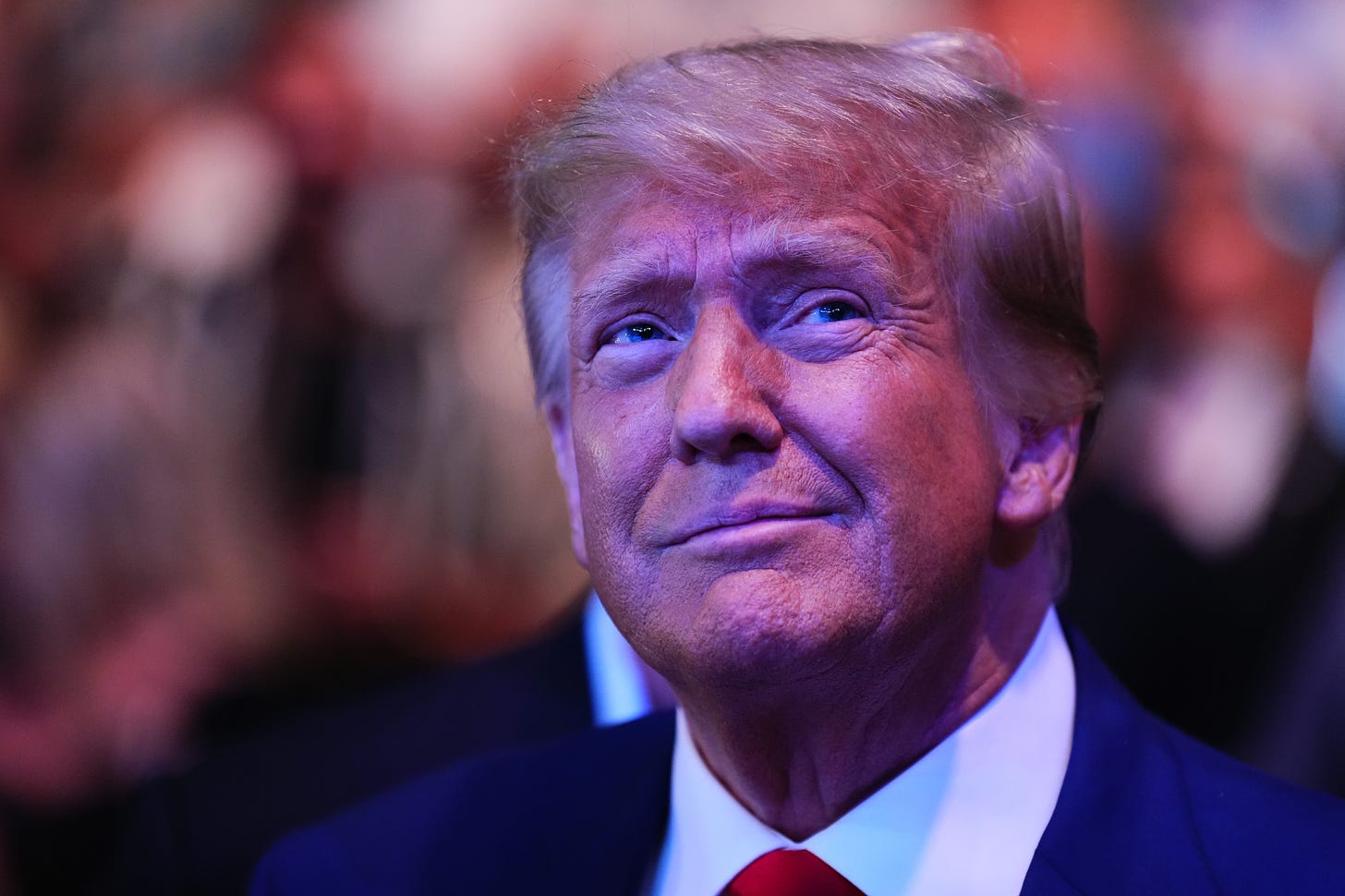Could a Special Plea Deal Keep Trump Out of the White House?
His comeback bid might not fail, but America might if he gets a second term.
JACK SMITH’S CLASSIFIED DOCUMENTS indictment of Donald Trump was a book of horrors detailing threats to national security, global security, lives, intelligence methods, relations with allies, and relations with foes. The January 6th indictment expected any day now will likely be even more graphic, harrowing, and damning.
It is tremendously satisfying after all this time to see facts and evidence assembled into an organized narrative of chaos, lawlessness, amorality, and insatiable needs—for attention, money, and control. Finally, the system is working. Finally, there are indictments that lay out a narrative for us and for the record. At the very least, there is accountability for the history books.
Unfortunately, it’s not enough. Not when Trump is on the brink of a comeback—an almost-certain third-time Republican nominee, with increasingly detailed plans to cement minority rule and his own powers and priorities across the entire government. “Presidents are not kings,” Supreme Court Justice Ketanji Brown Jackson wrote in a reproach to the Trump administration, when she was still a federal judge. But that’s what Trump seems to have in mind.
The question is how to guarantee that he never gets the chance. And though Trump may be facing four criminal indictments by summer’s end, with more possibly to come, there are fewer paths than most people might think—or hope.
Given those limits and a Republican party that has repeatedly allowed its rampaging former president to trample democracy, bold, creative thinking is necessary. For Trump, who fancies himself a master dealmaker, a particular deal comes to mind: allowing him to avoid prison if he agrees to drop out of the presidential race (or resign the presidency, if it came to that) and never run for public office again. Ever.
Practically speaking, this would take buy-in from multiple prosecutors and judges to work, a not inconsiderable hurdle. Democratic pollster Doug Schoen and former Rep. John LeBoutillier, an anti-Trump New York Republican, just floated a full-blown “universal plea agreement” in a weekend op-ed in the Messenger: Federal and state prosecutors suspend their criminal cases against Trump, while he “admits his guilt and accepts personal responsibility for his actions in each case,” withdraws from the campaign, and “agrees never to pursue any public office during the rest of his life.”
There are, of course, many more details and potential sticking points. Judges in each case would have to accept the plea deal and agree not to sentence Trump to prison or home confinement; who knows if all of them would. Caroline Mala Corbin, a constitutional law professor at the University of Miami, says such a deal would “seem to reward really bad behavior. . . . You can avoid the consequences that ordinary people have to face for the same crimes by just agreeing to forgo public office.” Furthermore, she told me in an email, “It is hard to imagine Trump ever admitting to wrongdoing” or voluntarily giving up his fame, fortune, and power.
LeBoutillier told me he’s known Trump since the early 1980s and “he will say anything to get out of trouble,” including if necessary an admission that “I’m guilty.” He’d later deny it and attack the prosecutors and the system, the former congressman predicted, but legally, that would be irrelevant. If he is facing jail, LeBoutillier said, “he will do it.”
Would this be unprecedented? Almost certainly. But then, the whole situation is unprecedented.
Would such a plea deal be legal or constitutional? Unclear, but in a case where the stakes for our constitutional system are already existential, it is worth exploring. And if it gets traction, the lawyers can fight it out.
A UNIVERSAL PLEA DEAL may seem like the most complicated and unlikely path to preventing a second Trump presidency, but not when compared with the other choices available. The Constitution has only three requirements for a president: You have to be at least 35 years old, born in the United States, and a U.S. resident for at least 14 years. It would be nice if the Founders had added “and not be a convicted felon,” but they did not.
They did include an impeachment option, which certainly seems like it would cover a recorded phone call of Trump pressuring Ukraine President Volodymyr Zelensky to find dirt on Joe Biden in exchange for a White House meeting and military aid Congress had already appropriated to help Ukraine fend off Russian aggression. The same goes, even more so, for a mendacious, violent, and clearly illegal plot to stay in power after losing the 2020 election, complete with another recorded phone call, this time Trump pressuring Georgia Secretary of State Brad Raffensperger to “find” more votes and flip the state to him.
Republicans could have banned Trump from public office for life by convicting him at either of two Senate impeachment trials, thereby ridding themselves of him and sparing the nation the ordeal we are likely to face in the months ahead. But—in LeBoutillier’s words—“they didn’t have the balls to do it, or the foresight.”
There’s an outside chance that Section 3 of the Fourteenth Amendment could be found to apply to Trump’s role in planning and encouraging the deadly January 6th Capitol attack. It disqualifies from public office any “officer of the United States” or any state official who took an oath to support the Constitution but “shall have engaged in insurrection or rebellion” against the United States, “or given aid or comfort to the enemies thereof.”
Among those disqualified under the amendment were several officials formerly aligned with the Confederacy and, most recently, New Mexico County Commissioner Couy Griffin, who participated in the January 6th insurrection, Citizens for Responsibility and Ethics in Washington said in a report this month. A state court removed Griffin from office on Fourteenth Amendment grounds after CREW sued on behalf of three New Mexico residents.
As it relates to Trump, Corbin calls the argument “a stretch.” First, while there is some debate about whether the president counts as an “officer of the United States” to whom the amendment applies—and Corbin says “most agree” that a president does count—the question remains whether Trump engaged in insurrection or gave aid and comfort to those who did. Maybe, she says. Congress has the authority to enforce the amendment under Section 5, she told me, “so Congress could pass a law stating that those public officials who incited or participated in the January 6 insurrection were ineligible for office.”
For its part, CREW argues that eligibility under Section 3 can be “adjudicated through civil lawsuits” like the one that disqualified Griffin in New Mexico. For presidential candidates, the group writes, the section “can be enforced by state election officials and in state courts as part of the process for determining who can appear on ballots for presidential elections.”
As intriguing as that possibility is, it would be a long, complicated process that might not produce results quickly enough and in enough states to matter. That said, it’s a better bet in this era than congressional action. Trump’s hold on his party killed not just two impeachment convictions but also any chance that the Twenty-fifth Amendment would be invoked after his supporters stormed the Capitol and threatened to “hang Mike Pence.” Even Pence said, in the immediate aftermath of January 6th, that he would not back using the Twenty-fifth Amendment to remove Trump, according to then-Education Secretary Betsy DeVos. She resigned after that discussion.
MOST REPUBLICAN VOTERS still can’t quit Trump. His lead in ten GOP primary polls this month has ranged from 25 to 44 points over the second-place DeSantis, his closest rival, and he has topped 50 percent in seven of them. He’s the presumptive nominee, even faced with years of trials, potential convictions and prison sentences. And as many have noted, it’s not impossible to run for president from prison. Socialist Party candidate Eugene V. Debs did it in 1920 and conspiracy theorist Lyndon LaRouche did it in 1992.
Surely voters in a general election would reject Trump, right? Just like they did in 2020? That’s what most national polls show. But not all of them. And presidential elections are not national. They are state by state, and enough states are so closely divided that third-party candidates or the Electoral College could easily return Trump to the Oval Office.
That may be an outside chance, an irrational fear, but a miscalculation delivers to us King Donald, with his own personal army of federal leaders and policymakers to harness the government to the benefit of himself, his family, and his friends and cronies. We’ve seen it all before: weaponized government, corrupt pardons, violence against perceived enemies, China trademarks and Saudi investments, voter suppression, and power at all costs.
I have no illusions that a universal plea agreement would “heal the country,” as Schoen and LeBoutillier write, but it might head off political, policy, and administrative disasters that would take generations to repair. We’ve got to try.





